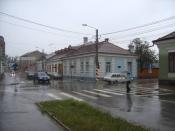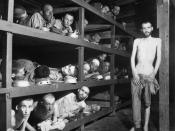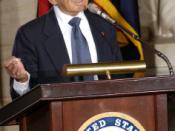This essay will explore the relationship between fact and fiction in the representation of the holocaust. I will explore Elie Wiesel's Night and Benjimin Wilkomirski's Fragments and analyse the contribution made by these books to the debate about the authenticity of survivor testimony. The two texts I will look at challenge the notions of truth and reality. They both claim to be factual accounts of an actual moment in time, yet there is strong evidence to suggest that both are fabricated. Some parts of Night have been challenged by critics as fictional whilst the events in Fragments have been challenged to such a degree that it is now generally believed that the holocaust testimony is a figment of Wilkomirski's imagination. It is important to note that Wilkomirski still insists that Fragments is a true account of his past .
Louis Montrose states that 'we can have no access to a full and authentic past, a lived material existence.'
Our only access to history is through texts. In this way texts not only represent our history but become the only history we know. Hayden White states that because historians shape historical evidence into literary forms, using language for dramatic effect, the writing of history will always be a fictive act. He views history as aesthetic, stating that 'historians do not find stories in the past but form the past into stories.' Since our only access to the Holocaust is through texts, the work of Wilkomirski and Wiesel offers us a looking-glass into the realities of a moment in time. The difference between the looking-glass and the actual reality is the key to understanding why the texts are both 'tokens of reality' and 'questionable as to their authenticity'.
Using White's theory, both Wilkomirski and Wiesel are unable to offer us the...



Reliability
Excellent essay! You put a lot of effort in this and it shows.
3 out of 3 people found this comment useful.